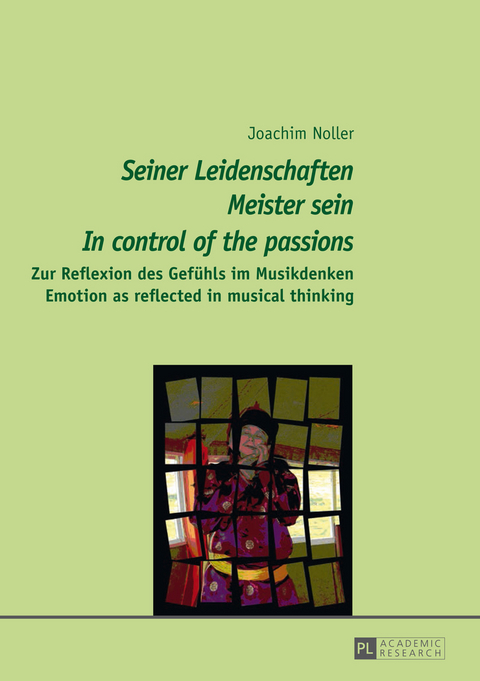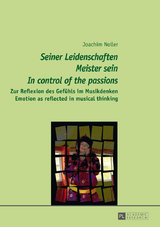«Seiner Leidenschaften Meister sein» - «In control of the passions»
Peter Lang Gmbh, Internationaler Verlag Der Wissenschaften
978-3-631-64361-7 (ISBN)
In a historical and philosophical perspective, the essays in this book deal with the idea of emotions and their role in the scenario of what is called music appreciation.
Was heißt es, wenn Carl Philipp Emanuel Bach vom ausführenden Musiker fordert, er müsse selbst gerührt sein, bevor er seine Zuhörer in Rührung versetzen könne? Der Autor schreibt über die Idee der Emotion, über ihre Rolle im Szenario sogenannter Musikanschauung (von ca. 1750 bis heute). Von Interesse ist dabei weniger die Gefühlshaltigkeit der Musik selbst, als vielmehr die Art, wie das Musikdenken dieselbe be- und verhandelt; nicht Emotionen in tatsächlicher Wirkung, sondern wie sie, als Denkfigur, in musikalischen Zusammenhängen theoretisch bewältigt werden.
What does it mean when Carl Philipp Emanuel Bach demands that a performing musician must himself be moved before he can move his listeners? The author writes about the idea of emotions and their role in the scenario of what is called music appreciation (from about 1750 till the present day). His focus is not primarily on the emotional content of music as such, but rather the way in which it is treated in thinking about music; not on the actual impact of emotions, but the way in which they have been thought about in a musical context, as concepts around which a theoretical discourse crystallizes.
Joachim Noller ist Musik- und Kulturwissenschaftler. Seine Forschungsschwerpunkte liegen auf experimentellem Musiktheater, der Aufarbeitung kultureller Errungenschaften des Novecento sowie philosophischen und ästhetischen Themen. Joachim Noller is a musicologist and cultural studies scholar. His main research interests are experimental music theatre and the cultural achievements of the Novecento as well as philosophical and aesthetic issues.
Inhalt/Contents: Gefühle theoretisch - Musik- und Gefühlsdenken - «Triumph» der Empfindsamkeit - Gefühlvolle Romantik? - Beethovens Pastorale - Ausdrucksästhetik, aus theologischer Sicht - Musiktheoretiker (Hanslick und Riemann) im Gefühlskampf - Janáceks Seelenambiente -Futuristische und andere Seelenzustände - Die Krise des Gesangs - Gefühlsverlassene Innerlichkeit: Webern und andere Expressionisten - Psycho-/Neurologische Rehabilitierung der Gefühlsästhetik? - Wie «präsent» sind ästhetische Gefühle? - Katharsis Feelings, in theory - Music and thinking about emotion - The «Triumph» of Sensibility - Emotional Romanticism? - Beethoven's Pastoral Symphony - A theological slant on the aesthetics of expression - Music theorists (Hanslick and Riemann) in a battle royal over emotions - Janácek and the ecology of the soul - Futurist and other states of the soul - The crisis of singing - Emotionally forsaken inwardness: Webern and other Expressionists - Psycho-/Neurological rehabilitation of the aesthetics of emotion? - How «present» are aesthetic feelings? - Catharsis.
| Erscheint lt. Verlag | 27.3.2014 |
|---|---|
| Verlagsort | Frankfurt a.M. |
| Sprache | englisch; deutsch |
| Maße | 148 x 210 mm |
| Gewicht | 600 g |
| Themenwelt | Kunst / Musik / Theater ► Musik ► Musikgeschichte |
| Kunst / Musik / Theater ► Musik ► Musiktheorie / Musiklehre | |
| Schlagworte | Ausdrucksästhetik • Control • Emotion • Emotional Romanticism • Gefühls • Gefühlvolle Romantik • Joachim • Krise des Gesangs • Leidenschaften • Meister • Musical • Musikdenken • Noller • passions» • reflected • Reflexion • Seelenzustände • sein» • «Seiner • Thinking |
| ISBN-10 | 3-631-64361-6 / 3631643616 |
| ISBN-13 | 978-3-631-64361-7 / 9783631643617 |
| Zustand | Neuware |
| Informationen gemäß Produktsicherheitsverordnung (GPSR) | |
| Haben Sie eine Frage zum Produkt? |
aus dem Bereich




